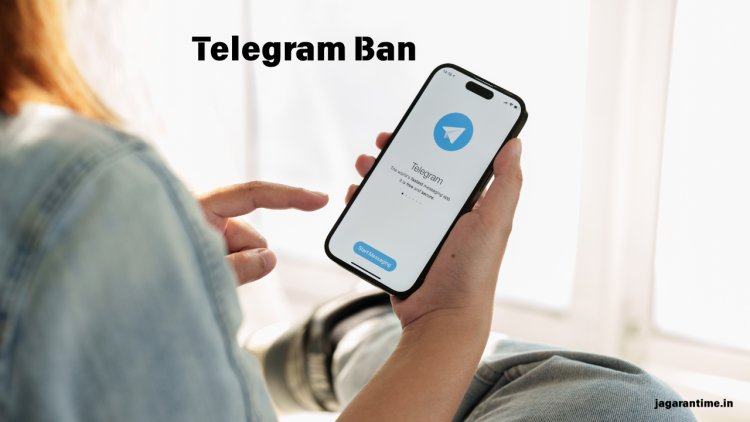Telegram Ban: This Country May Soon Ban Telegram Due to Illegal Content, Major Action Likely
Telegram has been banned in several countries due to illegal content. Learn which countries have banned Telegram and what the situation is like in India.

In today’s digital era, social media and messaging apps have become primary means of communication. Platforms like WhatsApp, Signal, and Telegram are especially popular because they offer end-to-end encryption and privacy-focused features. However, these very features are becoming problematic for governments and law enforcement agencies in many countries. That’s why several nations have already banned or are planning to ban Telegram.
Now another country—Vietnam—is preparing to impose a ban on Telegram. The reason? Telegram has become a hub for spreading illegal content and bypassing digital surveillance. Let’s understand why Telegram is under scrutiny, which countries have already banned it, and what the implications are for India.
Why Telegram Is Being Targeted?
Telegram, founded in 2013 by Pavel Durov, is considered one of the most secure messaging platforms. It allows users to create public or private channels, exchange large files, and chat anonymously. But this level of freedom has led to its misuse.
Several criminal and terrorist groups have used Telegram to share:
- Illegal content
- Drugs and arms information
- Child sexual abuse material
- Deepfakes and fake news
- Terrorist propaganda
Since the platform does not provide complete access to government agencies, many countries claim that it’s being used to bypass national security systems.
Vietnam May Soon Ban Telegram
The Vietnamese government has hinted that they are considering banning Telegram very soon. The country alleges that the platform is being used for money laundering and tax evasion. Authorities have stated that several foreign apps are not complying with Vietnamese cybersecurity laws, and Telegram tops the list.
The government has reportedly issued notices to the platform but received no satisfactory responses. If Telegram does not comply with local laws and fails to cooperate with the government, a complete ban is imminent.
Countries Where Telegram Is Already Banned
Before Vietnam, several other countries have banned Telegram either temporarily or permanently:
1. Russia: Although Telegram was developed by a Russian, it was banned in 2018 for refusing to provide encryption keys to security agencies. However, the ban was lifted in 2020 after partial cooperation.
2. Iran: Telegram is officially banned in Iran, though users still access it through VPNs.
3. China: China has long blocked Telegram, citing censorship and national security.
4. Pakistan: Pakistan banned Telegram temporarily, accusing it of being used by extremists.
5. India: While Telegram is not banned in India, it has come under criticism for being used to spread pirated content and hate messages.
Telegram’s Response So Far
Telegram has maintained that user privacy is its top priority. The company has said it will not compromise encryption or reveal user information to any government. However, in some rare cases, Telegram has cooperated with law enforcement—especially in terrorism-related investigations.
Even so, countries like Vietnam expect the platform to register locally, have a representative office, and follow data localization rules—demands that Telegram has yet to fulfill.
What Could Happen in India?
Although Telegram is not banned in India, authorities have raised serious concerns about it. Courts have issued several orders against Telegram channels sharing copyrighted content and movies. In 2023, the Bombay High Court asked Telegram to reveal the identity of users distributing illegal content, which it initially refused.
Given this background, if Telegram doesn’t take strong action against misuse in India, it could face similar pressure as in Vietnam. However, considering its large user base and growing popularity among Indian users, a complete ban is unlikely in the immediate future.
The Growing Global Concern Over Privacy vs. Regulation
Telegram’s case has once again brought up the global debate between privacy and regulation. On one hand, users demand complete privacy from surveillance. On the other hand, governments argue that unchecked platforms can become dangerous breeding grounds for crime and terrorism.
To bridge this gap, some experts suggest middle-ground solutions such as:
- Third-party audits of app security
- Setting up local grievance redressal systems
- Cooperative compliance without compromising user privacy
Whether Telegram will agree to such measures remains to be seen.
Conclusion
As digital communication platforms grow, so do the challenges around data privacy, misuse, and regulation. The action being taken against Telegram in Vietnam and other countries highlights how governments are now no longer willing to tolerate non-compliant platforms. Telegram needs to act fast to update its policies or risk being banned in multiple nations.
In India, the situation is still under control, but users and the platform alike must stay aware. If Telegram wants to maintain its global popularity, it must find a way to balance privacy with legal compliance.













